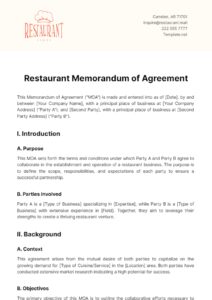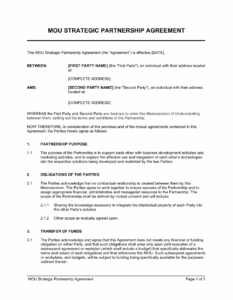Planning an event that features delicious food is an exciting venture, whether it’s a bustling street fair, a corporate gathering, or a local festival. However, bringing together various food vendors requires more than just a good location and hungry attendees. It demands clear communication, established expectations, and a solid framework to ensure everyone is on the same page, preventing potential headaches down the line. That’s where a clear, well-structured agreement comes into play, helping both organizers and vendors understand their roles and responsibilities.
While a full-fledged legal contract might feel too formal or complex for every situation, especially in the preliminary stages or for smaller events, a Memorandum of Understanding (MOU) offers a fantastic middle ground. It’s a non-binding agreement that outlines the intent of all parties involved, setting the stage for a professional and organized partnership. Having a reliable food vendor memorandum of understanding template can be an invaluable tool for streamlining this process, ensuring all the critical details are covered without the heavy legal jargon of a full contract.
Why You Need a Food Vendor MOU
A Memorandum of Understanding, often referred to as an MOU, acts as a blueprint for collaboration. In the context of food vending, it’s a document that details the mutual understanding and expectations between an event organizer and a food vendor. Think of it as a pre-contractual agreement that lays out the groundwork, clarifies roles, and outlines the scope of engagement before, or sometimes in place of, a more legally binding document. While it typically isn’t legally enforceable in the same way a contract is, its strength lies in establishing clear communication and demonstrating a commitment to a shared objective.
The primary benefit of using an MOU is clarity. It minimizes misunderstandings by explicitly stating what each party expects from the other. For event organizers, it means ensuring vendors understand site rules, operational hours, and logistical requirements. For food vendors, it clarifies what facilities or support they can expect from the organizer, such as power access, designated space, and marketing efforts. This transparent approach fosters trust and professionalism, creating a smoother experience for everyone involved, from setup to tear-down, and ultimately for the event attendees.
Key Elements to Include in Your Food Vendor MOU
- Parties Involved: Clearly identify the full legal names and contact information of both the event organizer and the food vendor. This ensures there’s no ambiguity about who is entering into the understanding.
- Purpose of the Agreement: Outline the specific event, its date(s), location, and the general objective of the vendor’s participation. This sets the context for the entire document.
- Vendor Responsibilities: Detail what is expected of the food vendor. This could include specifics about their menu, required equipment, staffing levels, adherence to health codes, licensing, and setup/teardown procedures.
- Organizer Responsibilities: Clearly state what the event organizer will provide. This might cover the allocated space, access to power and water, marketing support, waste management services, and security measures.
- Financial Arrangements: Even in a non-binding MOU, it’s wise to outline any agreed-upon fees, commission structures, or payment schedules. This sets financial expectations early on.
- Term and Termination: Specify the duration of the understanding and the conditions under which either party might choose to withdraw from the arrangement, even if non-binding.
- Dispute Resolution: A simple statement on how potential disagreements might be addressed, perhaps through informal discussion or mediation, can be helpful for maintaining good relations.
- Signatures: Spaces for authorized representatives from both the organizer and the vendor to sign and date the document, acknowledging their understanding and intent.
Including these elements transforms a vague handshake agreement into a professional statement of intent. It serves as a valuable reference point throughout the planning process and during the event itself, allowing both parties to refer back to agreed-upon terms if any questions arise. This structured approach helps in building robust, lasting relationships within the event and culinary communities.
Customizing Your Food Vendor Memorandum of Understanding Template
While a generic food vendor memorandum of understanding template provides an excellent starting point, its true value comes from its adaptability. Every event is unique, and so is every food vendor’s operation. Therefore, it’s crucial to customize your MOU to fit the specific needs, circumstances, and expectations of your particular event and the vendors you’re partnering with. This tailoring ensures that the document accurately reflects the agreed-upon terms and addresses any unique considerations that might arise.
Factors like the event’s size, its theme, the venue’s limitations, local health regulations, and the specific type of food service being offered will all influence how you adapt the template. For instance, a small community market might have different requirements than a large music festival. Similarly, a vendor selling pre-packaged goods will have different needs and responsibilities than one operating a full-service food truck with on-site cooking. Taking the time to personalize your MOU shows a thoughtful approach and attention to detail, which vendors will appreciate.
Consider these areas for customization:
- Specific Site Details: Include a detailed map showing the exact vendor location, access points, and proximity to facilities like restrooms or waste bins.
- Equipment and Utility Requirements: Go beyond basic power needs. Specify voltage, amperage, water source access, and any propane or specialized equipment usage.
- Marketing and Branding Opportunities: Detail how the vendor will be promoted (e.g., website listing, social media mentions, inclusion in event program) and any branding guidelines.
- Health and Safety Protocols: Beyond standard permits, include any event-specific health and safety requirements, such as food temperature logging, handwashing station mandates, or specific waste disposal methods.
- Insurance Requirements: Clearly state the minimum liability insurance coverage required from vendors and any additional insured endorsements needed.
By thoughtfully customizing each section of your food vendor memorandum of understanding template, you create a document that is not only comprehensive but also highly relevant to your specific partnership. This level of detail helps prevent oversights, clarifies expectations from the outset, and sets the stage for a successful and harmonious collaboration between event organizers and food vendors. It’s about building a foundation of mutual understanding that benefits everyone involved and contributes to an outstanding event experience.
Ultimately, having a clear and comprehensive understanding in place lays the groundwork for successful partnerships and memorable events. It allows both parties to focus on delivering high-quality service and an enjoyable experience, rather than getting bogged down in logistical uncertainties or minor disagreements. By taking the time to outline expectations upfront, you create an environment of professionalism and mutual respect.
Embrace the power of clear communication and organization in your event planning. Utilizing a well-structured food vendor memorandum of understanding template as your foundation ensures that every partnership begins with a solid, transparent understanding. This proactive approach leads to smoother operations, stronger relationships, and ultimately, an unforgettable culinary experience for everyone involved.

